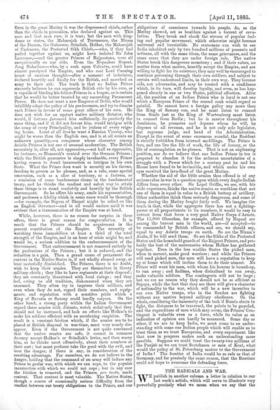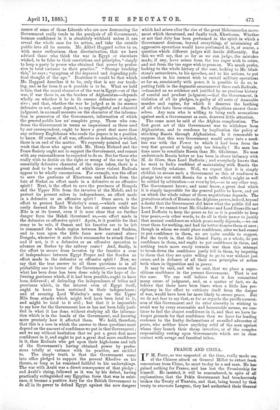THE RADICALS AND WAR.
WE publish in another column a letter in relation to our last week's article, which will serve to illustrate very powerfully precisely what we mean when we say that the
course of some of those Liberals who are now denouncing the Government really tends to the paralysis of all Government, because confidence in it is absolutely withheld unless it can reveal the whole case for its action, and take the outside public into all its secrets. Mr. Alfred Haggard writes to us, with more enthusiasm than discrimination, that we have advised those who think the war in Egypt or elsewhere wicked, to be false to their convictions and principles, "simply to keep a party in power who obtained that power by profession in total variance to their practice." " Strange teaching this," he says ; "symptom of the depraved and degrading political thought of the age." Doubtless it would be that which Mr. Haggard describes it to be, only that is not our teaching, and as far from it as it possible is to be. What we hold is this, that the moral character of the war in Egypt—or of the war, if war there is, on the borders of Afghanistan—depends wholly on whether it be in ifs essence defensive or aggressive ; and that, whether the war be judged as in its essence defensive or not, must depend, to any thoughtful and educated judgment, in no small measnre on the character of the information in possession of the Government, information of which the general public has no complete grasp. Those who condemn the Government in terms so impassioned as those used by our correspondent, ought to know a great deal more than any ordinary Englishman who reads the papers is in a position to know. Of course, if all war, offensive or defensive, is wicked, there is an end of the matter. We expressly pointed out last week that those who agree with Mr. Henry Richard and the Peace Society ought not to support the Government, and cannot with any reasonableness be expected to do so. But for those who really wish to decide on the right or wrong of the war by the essentially defensive character of the steps taken, there is a great deal to be considered, of which these violent Radicals appear to be wholly unconscious. For example, was the effort to save the garrisons of Khartoum and Kassala from the fate of Sinkat an effort made in a defensive or an offensive spirit ? Next, is the effort to save the provinces of Dongola and the Upper Nile from the invasion of the Mandi, and to protect its present rulers in independence, an effort made in a defensive or an offensive spirit ? Once more, is the effort to protect Lord Wolseley's army,—which could not easily descend the Nile in the heats of summer while the Nile is at its lowest, even if it were clear that no further danger from the Mandi threatened us,—an effort made in the defensive or offensive spirit? Again, is it possible for that army to be safe, if Osman and his fanatics are to be left to command the whole region between Berber and Suakim, and to turn upon the little force now cantoned above Dongola, whenever it suits their commander to attack them ? and if not, is it a defensive or an offensive operation to advance on Berber by the railway route ? And, finally, is the effort to secure from invasion by the fanatics a zone of independence between Egypt Proper and the Soudan an effort made in the defensive or offensive spirit ? Now, we say that the true answer to all these questions is in all probability one in favour of the Government,—we mean that what has been done has been done solely in the hope of delivering garrisons which, if it had been possible, ought to have been delivered ; of defending the independence of tribes and provinces which, in the interest even of Egypt itself, ought to have been sustained in their independence ; and of securing Lord Wolseley's army on the Upper Nile from attacks which might well have been fatal to it, and might be fatal to it still ; but that it is impossible to say how far the Government has or has not been fully justified in what it has done, without studying all the information which is in the hands of the Government, and knowing more precisely how it affected them. We hold, therefore, that this is a case in which the answer to these questions must depend on the amount of confidence we put in that Government ; and we say without hesitation that we put a great deal more confidence in it, and ought to put a great deal more confidence in it, than Radicals who get upon their high-horse and talk of the Government's having obtained power by professions totally at variance with its practice, are entitled to. The simple truth is that the Government came into office pledged to support the present Khedive on his throne, so long as he remained faithful to his undertakings. The war with Arabi was a direct consequence of that pledge ; and Arabi's rising, followed as it was by his defeat, having practically extinguished any Egyptian force that was in existence, it became a positive duty for the British Government to do all in its power to defend Egypt against the new dangers which had arisen after the rise of the great Mahommedan movement which threatened, and finally took, Khartoum. Whether or not that duty has been performed in the spirit in which a Government desirous, beyond everything, of minimising alt aggressive operations would have performed it, is, of course, a question which different judges will decide differently. But this we will say, that so far as we can judge, the mistakes made, if any, have arisen from the too eager wish to retire, and not from the too eager wish to press on. We much prefer, looking to the whole history of the case, looking to Mr. Gladstone's antecedents, to his speeches, and to his actions, to put confidence in his earnest wish to curtail military operations so far as, consistently with peace, it is possible to do so, to putting faith in the dogmatic assurances of these rash Radicals, —founded on no evidence and justified by no previous history of careful and prudent judgment,—that the Government, in violation of all its pledges, is guilty of all sorts of damnable murder and rapine, for which it deserves the loathing of all who hate these crimes. Such allegations answer themselves. Any man who is willing to bring such accusations against such a Government as ours, deserves little attention.
The same must be said of the Afghan complication. The first great act of this Government was to withdraw front Afghanistan, and to condemn by implication the policy of attacking Russia through Afghanistan. Is it reasonable to suppose that this very Government would enter into a needless war with the Power to which it had been from the very first accused of being only too friendly ? No man has done more-to conciliate Russia than Mr. Gladstone. No man understands Russia better or has been in closer intimacy with M. de Giers, than Lord Dufferin ; and everybody knows that he went to India confident of maintaining with Russia the most friendly relations. Well, we repeat that it is simply childish to accuse such a Government as this of readiness to plunge into war with Russia for a trifle which might as well bo settled by arbitration—or even by lot,—as in any other way. The Government knows, and must know, a great deal which it is simply impossible for the general public to know, and yet on which the whole colour of these negotiations depends. The gratuitous attack of Russia on the Afghans proves, indeed, beyond a doubt that the Government did know what the public did not know. If we cannot trust Mr. Gladstone and Lord Granville and Lord Dufferin to keep the peace so far as it is possible to keep true peace,—in other words, to do all in their power to justify that mutual confidence on which peace really depends,—we can trust them for nothing, and had far better dismiss them at onoe; though in whom we could place confidence, after we had ceased to put confidence in them, we are quite unable to suggest. But the truth is, that the Liberal Party, as a whole, do put confidence in them, and ought to put confidence in them, and nothing tends more surely towards war than this attempt to break-down the confidence justly felt in them, by imputing to them that they are quite willing to go to war without just cause, and in defiance of all their own principles of action both when in Opposition and in power.
It may be said, and will be said, that we place a superstitious confidence in the present Government. That is not the case. We can well believe that it has committed many errors of judgment, and, as a matter of fact, we do believe that there have been times when a little less precipitancy in the effort to extricate itself from the danger of war, would have been far more likely to secure peace. But we do not fear to say that, so far as regards the pacific earnestness of this Government and its utter sincerity in wishing to avoid war by every reasonable and honourable means, we continue to feel the utmost confidence in it, and that we have far deeper grounds for that confidence than we have for lending credence to the frothy declamations of so-called advocates of peace, who neither know anything solid of the men against whom they launch their cheap invective, or of the complex responsibility resting upon Governments which are in close contact with savage and fanatical tribes.



































 Previous page
Previous page